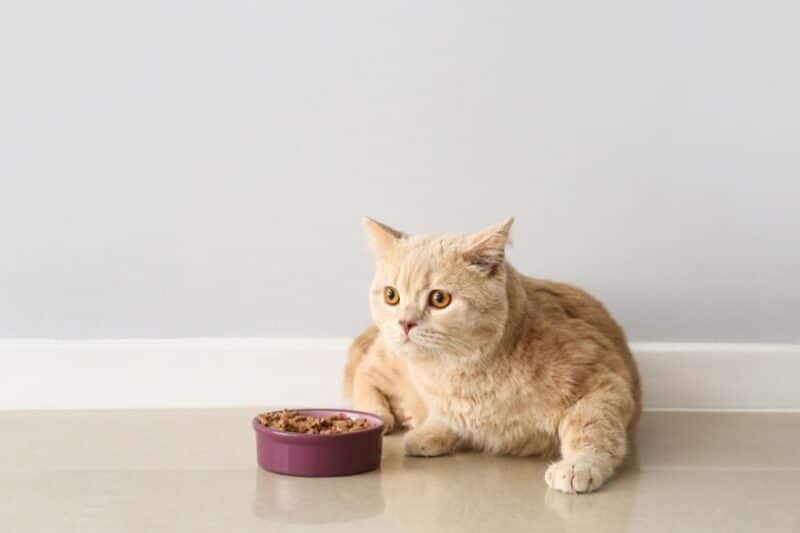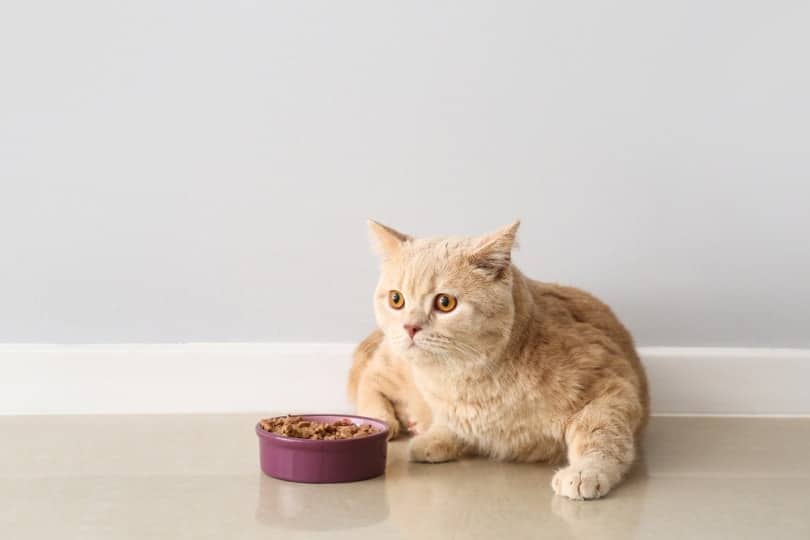If the cat suddenly stops eating, consult a veterinarian immediately. A sudden change in appetite can indicate health issues.
Cats can be finicky eaters, but a sudden refusal to eat is alarming. Several factors can cause this behavior, including stress, dental problems, or underlying health conditions. Cats are prone to hiding their discomfort, making it crucial to address any changes promptly.
A veterinarian can diagnose potential issues and recommend appropriate treatments. Ensuring your cat’s diet remains appealing and nutritious is vital for its overall health. Early intervention can prevent more severe complications and help maintain your feline friend’s well-being. Regular vet check-ups and monitoring your cat’s eating habits are essential for its long-term health and happiness.
Table of Contents

Credit: www.reddit.com
Identify The Cause
When your cat suddenly stops eating, it’s important to identify the cause. Understanding the reason behind your cat’s lack of appetite can help you address the issue effectively. Let’s explore some key areas to check.
Check For Illness
A sudden loss of appetite can often indicate a health problem. Here are some potential illnesses to consider:
- Dental Issues: Check if your cat has sore gums or broken teeth.
- Infections: Look for signs of a respiratory or urinary infection.
- Kidney Disease: Be alert for symptoms like frequent urination or lethargy.
- Gastrointestinal Problems: Notice if your cat vomits or has diarrhea.
Consult your vet for a thorough check-up to rule out these issues.
Assess Recent Changes
Sometimes, changes in the environment can affect your cat’s eating habits. Consider these factors:
- New Pet or Person: A new addition to the home can stress your cat.
- Change in Food: Switching food brands may cause your cat to stop eating.
- Routine Disruption: Any change in daily routines can upset your cat.
- New Surroundings: Moving to a new home can make your cat anxious.
Try to maintain a stable and calm environment for your cat.
| Possible Cause | Signs to Look For | Action to Take |
|---|---|---|
| Dental Issues | Sore gums, broken teeth | Consult a vet |
| Infections | Respiratory issues, urinary problems | Seek veterinary help |
| New Pet or Person | Stress, hiding | Give time to adjust |
| Change in Food | Refusal to eat | Switch back to old food |
By identifying the cause, you can help your cat return to its normal eating habits.
Consult A Veterinarian
If your cat suddenly stops eating, it can be very worrying. This can indicate a serious health issue. The best action is to consult a veterinarian. Professional help ensures your cat gets the right care.
Schedule An Appointment
Call your veterinarian immediately to schedule an appointment. It is crucial to act quickly. A sudden loss of appetite can be a sign of illness. Do not wait for the problem to resolve itself. Early intervention can prevent complications.
Provide Detailed Information
When you visit the vet, bring all necessary details. This includes your cat’s medical history, recent behavior changes, and any diet changes. Be ready to answer questions about your cat’s daily routine. This helps the vet make an accurate diagnosis.
| Information | Details |
|---|---|
| Medical History | Past illnesses, surgeries, and medications |
| Recent Behavior Changes | Any unusual activity or habits |
| Diet Changes | New food types or brands |
Providing complete information helps the vet understand the issue better. This leads to a more effective treatment plan. Remember, your cat’s health depends on your prompt action and thoroughness.
Monitor Hydration
When a cat suddenly stops eating , monitoring its hydration is crucial. Cats can easily become dehydrated. Dehydration can lead to severe health issues. Here’s how you can ensure your cat stays hydrated.
Encourage Water Intake
Encouraging your cat to drink water is essential. Cats are often not keen drinkers. You can make water more appealing by providing fresh water daily. Use a clean bowl. Some cats prefer running water. Consider a cat water fountain. Wet cat food can also increase water intake. You can add a bit of water to dry food. This can help keep your cat hydrated.
Recognize Dehydration Signs
Recognizing the signs of dehydration is vital. Here are some common signs:
- Dry gums
- Sunken eyes
- Lethargy
- Loss of skin elasticity
To test skin elasticity, gently pinch the skin at the back of the neck. If it doesn’t snap back quickly, your cat might be dehydrated. If you notice these signs, consult a vet immediately.

Credit: www.catster.com
Evaluate Food Quality
When your cat suddenly stops eating, it can be worrisome. One important step is to evaluate the food quality. Cats are picky eaters, and any change in their food can affect their appetite. Here are some ways to ensure the food quality is up to par.
Inspect Expiration Dates
Always check the expiration dates on cat food packages. Expired food can lose its taste and nutritional value. Feeding expired food can make your cat sick. Make it a habit to check these dates regularly. Keep a record to avoid accidentally giving your cat expired food.
| Food Type | Expiration Period |
|---|---|
| Dry Food | 6-12 months |
| Wet Food | 1-2 years |
Consider Food Allergies
Cats can develop food allergies over time. Common allergens include chicken, beef, and dairy. If your cat suddenly stops eating, it might be allergic to an ingredient. Monitor for symptoms like itching, vomiting, or diarrhea.
If you suspect an allergy, consult your vet. They may suggest an elimination diet to identify the allergen. You may need to switch to hypoallergenic cat food. Always introduce new food gradually to your cat’s diet.
- Switch to hypoallergenic food
- Introduce new food gradually
- Monitor for allergy symptoms
Experiment With Different Foods
If your cat suddenly stops eating, it can be worrying. One effective approach to encourage eating is to experiment with different foods. Cats can be picky, but trying various options might stimulate their appetite. Here are some ways to get your cat interested in food again.
Try Wet Food
Sometimes, cats get bored with their usual dry kibble. Switching to wet food can make a big difference. Wet food has a stronger smell and taste, which can entice your cat to eat. You can try offering small portions at first. This way, you can see if your cat prefers it.
If your cat enjoys the wet food, you can gradually increase the amount. You can also mix wet food with their usual dry food. This can make the transition smoother. Always ensure the food is fresh and served at room temperature. Cold food straight from the fridge might not appeal to your cat.
Introduce New Flavors
Cats can be very particular about flavors. If your cat suddenly stops eating, try introducing new flavors. Variety can make mealtime more exciting for your cat. Start by offering a small amount of a new flavor. You can find different flavors like chicken, fish, or beef.
You can create a flavor rotation to keep things interesting. Here is a simple table to help you plan a flavor rotation:
| Day | Flavor |
|---|---|
| Monday | Chicken |
| Tuesday | Fish |
| Wednesday | Beef |
| Thursday | Turkey |
| Friday | Salmon |
| Saturday | Lamb |
| Sunday | Duck |
This rotation helps keep your cat’s diet varied and interesting. Always observe your cat’s reaction to new flavors. If they like a particular flavor, you can add it to their regular diet.
Create A Stress-free Environment
When a cat suddenly stops eating, it can be worrying. One major factor could be stress. Creating a calm, stress-free environment can encourage your cat to eat again.
Reduce Noise Levels
Cats are sensitive to loud noises. Make sure your home is quiet. Turn down loud music and the TV. Avoid noisy household chores near your cat’s eating area. A peaceful setting can make your cat feel safe and more likely to eat.
Provide Safe Spaces
Cats need places to hide. Create safe spaces where they can retreat. Use cozy cat beds, boxes, or even blankets. Place these in quiet corners of your home. A safe space can help your cat feel secure and reduce stress.
| Stress Factor | Solution |
|---|---|
| Noise | Reduce volume of TV, music, and chores |
| Lack of Safe Space | Create cozy corners with beds or boxes |
- Keep the home environment calm.
- Make sure your cat has hiding spots.
- Minimize loud noises near the feeding area.
Use Appetite Stimulants
Has your cat suddenly stops eating? This can be alarming. One effective solution is using appetite stimulants. These can help your cat regain its appetite. Here’s how to use them effectively.
Consult Your Vet
Always consult your vet before using any appetite stimulants. The vet can diagnose any underlying health issues. They will recommend the best treatment for your cat. Your vet can also guide you on the correct dosage. This ensures your cat gets the best care.
Natural Alternatives
There are many natural alternatives to stimulate your cat’s appetite. Here are some options:
- Catnip: Some cats love catnip. It can stimulate their appetite.
- Bone Broth: Warm bone broth is tasty and nutritious.
- Wet Food: Wet food can be more appealing than dry kibble.
These natural options are safe and easy to try. Always observe your cat’s reaction. If they show improvement, continue with these methods.
| Natural Stimulant | Benefits |
|---|---|
| Catnip | Enhances mood and appetite |
| Bone Broth | Nutritious and flavorful |
| Wet Food | More appealing than dry food |
- Always monitor your cat’s eating habits.
- Consult your vet for professional advice.
- Try natural alternatives first.
Monitor Long-term Behavior
Monitoring your cat’s long-term behavior helps identify any health issues early. Consistent observation ensures your cat stays happy and healthy.
Track Eating Patterns
Keep a daily log of your cat’s eating habits. Note the amount of food consumed at each meal.
- Record the type of food your cat eats.
- Track the time of day they eat.
- Note any changes in their appetite.
This data helps you spot unusual patterns. You can catch issues before they become serious.
Note Any Recurrences
Pay attention to repeated changes in eating behavior. Recurring issues might signal an underlying problem.
| Week | Behavior Noted |
|---|---|
| 1 | Skipped meals twice |
| 2 | Ate less on three days |
| 3 | Ignored favorite food |
Use the table to track any recurring behavior. This helps your vet diagnose the issue faster.
Early detection of issues can prevent serious health problems. Stay vigilant and keep your cat healthy.

Credit: www.catster.com
Frequently Asked Questions
Why has my cat suddenly stopped eating?
There could be several reasons why your cat has suddenly stopped eating.Health Issues,Stress or Changes,Pain or Discomfort,Medication Side Effects,Food Preferences. If your cat has stopped eating for more than 24-48 hours, it’s best to consult a veterinarian to determine the underlying cause and appropriate treatment.
Can a cat recover from not eating?
Yes, a cat can recover from not eating, but prompt veterinary care is crucial to address the underlying cause and prevent serious health issues.
Why Did My Cat Stop Eating All Of A Sudden?
Your cat may stop eating due to stress, illness, dental issues, or changes in diet. Consult a vet immediately.
What To Do When A Cat suddenly Stops Eating?
Consult a vet immediately. Ensure fresh water is available. Try offering wet food or treats. Monitor for other symptoms.
How Long After A Cat suddenly Stops Eating Do They Pass?
A cat can pass away within 3-4 days after stopping eating. Immediate veterinary care is crucial to prevent this.
What Happens If A Cat Doesn’t Eat For 3 Days?
A cat not eating for 3 days can lead to serious health issues. Seek veterinary attention immediately. Cats can develop hepatic lipidosis, a potentially fatal liver condition. Early intervention is crucial.
Conclusion
Consult your vet if your cat suddenly stops eating suddenly. Timely intervention can prevent severe health issues. Ensure a stress-free environment and monitor their behavior. Offer a variety of foods to stimulate appetite. Your prompt attention can help your feline friend return to their normal eating habits quickly.
